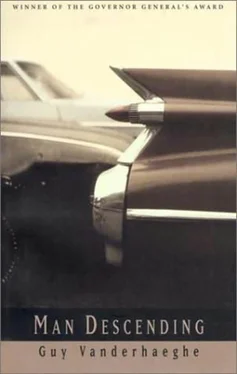The poor man’s obvious sincerity touched me as much as his logic bewildered me. Why did he presume those people had any interest in going to Russia? Didn’t he know it was Sweden they wanted to get to? Volvos, guiltless sex, Bergman films, functional furniture. Hey, I wanted to shout back, these people would prefer Sweden! And realizing for the first time where my wife and her friends were bound, I admitted I didn’t want to go along. I was the one the gentleman was addressing. Although at the time I didn’t know my longing was for Russia.
Oh, not the Russia he meant. Not Soviet Russia. But nineteenth-century Russia, the Russia of Dostoevsky’s saintly prostitutes and Alyosha; of Tolstoy’s Pierre; and Aksionov, the sufferer in “God Sees the Truth But Waits.” A country where the characters in books were allowed to ask one another the questions: How must I live to be happy? What is goodness? Why does man suffer? What is to be done?
I had set a timid foot on that Eurasian continent years ago when, as a student in a course on European literature in translation, I had read some of the Russian masters. I returned because I was unhappy and because I sensed that only in Russia does unhappiness find a meaning. Like Aksionov, who suffered in place of the real murderer and thief, I felt a hundred times worse, a hundred times more guilt. I don’t suppose I let it show much. I punished Miriam by putting our daughter’s framed photograph on the end table, by drinking too much, and by being rude to people she wished desperately to impress.
Still, I was faithful to her in a purely technical sense until I met Janet several months ago. Janet is a young artist who supports herself as a substitute teacher; we met in the staff-room of my high school. At the end of that particular day, a bitterly cold one late in November, I spotted her waiting at the bus stop, looking hypothermic in the kind of tatty old fur coat creative people buy at Salvation Army thrift stores. I offered her a ride. She, in turn, when I had driven her home, offered me coffee.
I think it was the splendour of the drawings and paintings lending life to her old, decaying, high-ceilinged apartment that attracted me to her. Perhaps I felt she could salvage any wreck and breathe life into it, as she had that apartment. Here , I thought, gazing at the fire on her walls, is a Russian soul .
I asked if I could come back another day to make a purchase. She assured me that I could, that she would be delighted. I returned, bought a drawing. Returned again and carried away a canvas. Simply put, one thing led to another. We became lovers. Regularly, on school-days between three-thirty and four-thirty, p.m., she screwed me with clinical detachment. If I close my eyes I can see her hard little jockey-body rocking above me, muscles strained and taut (I could pluck the cords on her neck) as she mutely galloped me hither and thither, while I snorted away under her like old Dobbin.
That it was nothing more than a little equestrian exercise I lacked the courage to see.
Dr. Herzl makes a point of telling me how pleased he is that there have been no more letters since last we met. He sits behind his desk, bathed in pale March sunshine and self-assurance. I am struck by his aseptic smile and unlined face, hardly the face of a man privy to so many sorrows. More than most men, certainly.
Out of the blue he asks: “I think we’re ready to talk about the Opening. And Janet. Don’t you?”
“We could.” I clear my throat and look at my hands. They’re very soft. The therapists here have tried to encourage me to take up handicrafts. However, if I cannot make boots like Tolstoy I will do nothing in that line.
“I’m interested to know the reasons why you posed for her. Particularly in light of what subsequently happened, it seems an odd thing for you to do.”
“I didn’t want to.”
“But you did nevertheless.”
“Obviously.”
“Why?”
“Because she said she needed to sketch from life, and now that she wasn’t a student she didn’t get the opportunity. She couldn’t afford to pay a model.”
“So you wanted to help her with her work?”
“Yes.” I knew how much it meant to her. Even then I knew what she was: a gifted, intense, ambitious girl, who was also a little bit stupid about things that had nothing to do with her art, and therefore did not concern her.
I can see by the look in the doctor’s eyes that he is about to chance something. “Could it have been that modelling was a way of safely exposing yourself? Exposing yourself without having to fear consequences?”
“No.”
He presses his hands together. “Why did you take such violent exception when you learned that the sketches were to be shown?” he asks softly.
“You can’t be serious.”
“Perfectly. I am perfectly serious. Tell me why.”
“Because she didn’t tell me,” I say. I am unable to keep the anger out of my voice. “I saw it on a poster. ‘Janet Markowsky: Studies in the Male Nude’.”
“Any other reason?”
“Sure. This is a small city. I’m a teacher. Somebody would recognize me. How the hell could I walk into a classroom after every kid in the school had gone down to take a gander at old Caragan’s wazoo?”
“You’re exaggerating.”
“And you don’t know kids. Anyway, it was the principle of the thing. Don’t you see?” My hands have begun to tremble, I trap them between my knees.
“Were you disturbed that there were drawings of other men?”
“No.”
“Are you sure?”
“I went to Janet and I said, ‘For God’s sake, what are you doing to me? I can’t take this right now. Please, take the sketches out of the show.’ ” It was a bad time for me. Cynthia’s birthday was coming up and every year she gets older, the more her face haunts me.
“And?”
“She said she was very sorry but this opportunity had suddenly presented itself. A small gallery had an immediate opening because the artist slotted had decided to show in Calgary. Janet said she hadn’t time to produce new work. She had to go with the drawings. With what she had. ‘Janet,’ I said, ‘I’m a teacher, put a moustache on me. Anything!’
“ ‘I can’t touch them,’ she said. ‘I could screw them up really badly. You never can tell what you’ll do when you start mucking around with things.’ ”
“I phoned Ms. Markowsky yesterday and I asked her a question,” says Herzl severely.
“What question?” I am surprised.
“I asked her if you wanted her to change the penises. It was just a hunch,” he says, very much the clever, smug detective. “She said you did. She said you wanted them made bigger.”
I put my head in my hands. I should have known it. The little bitch is the type to make sure she gets even. She won’t forgive me for ruining her Opening. Herzl, the moron, gave her the clue she needed to do it. Not that I really mind. “I wanted a moustache,” I say tiredly.
Herzl is really on a roll now. “Why did you take all your clothes off and walk through the gallery, Mr. Caragan? Did you think you would frighten people with your penis? Do you think it is menacing?”
“Because I’m crazy,” I say. “Because I thought Life should imitate Art.”
The hospital is silent at night. Nothing like I would have imagined – no dim cries, or the muffled sounds of sleepers dreaming bad dreams. Everyone has sunk into the opaque slumber of the correctly dosed and medicated. Except me. I hide my pills under my tongue and make a magnificent show of swallowing.
I hear the night-duty nurse go by. The moon is so bright tonight, so full and white and gleaming, that I can write my fifth letter to Dr. Herzl without showing a light under my door and risking detection at three o’clock in the morning.
Читать дальше












